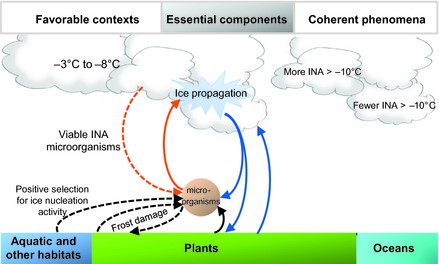Pseudomonas syringae: Bioprecipitation Mechanisms and Implications
From MicrobeWiki, the student-edited microbiology resource
Overview
By Brandon Byrd
Introduce the topic of your paper. What is your research question? What experiments have addressed your question? Applications for medicine and/or environment?
Sample citations: [1]
A citation code consists of a hyperlinked reference within "ref" begin and end codes.
History
File:SEM P.syringae.jpg
Fig.2 The bioprecipitation cycle diagram with two key factors that highlight the system. First, micro-organisms such as P.syringae that conduct the ice nucleation process. Second, the water vapor from plants, oceans, and aquatic environments that these micro-organism use in the atmosphere. http://onlinelibrary.wiley.com/doi/10.1111/gcb.12447/epdf.
.
Every point of information REQUIRES CITATION using the citation tool shown above.
Bioprecipitation and
P.syringae’s Role in Bioprecipitation

Fig.2 The bioprecipitation cycle diagram with two key factors that highlight the system. First, micro-organisms such as P.syringae that conduct the ice nucleation process. Second, the water vapor from plants, oceans, and aquatic environments that these micro-organism use in the atmosphere. http://onlinelibrary.wiley.com/doi/10.1111/gcb.12447/epdf.
Include some current research, with at least one figure showing data.
Mechanisms for Ice Nucleation
Include some current research, with at least one figure showing data.
Ecological Implications of
P.syringae Bioprecipitation
Conclusion
References
Authored for BIOL 238 Microbiology, taught by Joan Slonczewski, 2016, Kenyon College.
